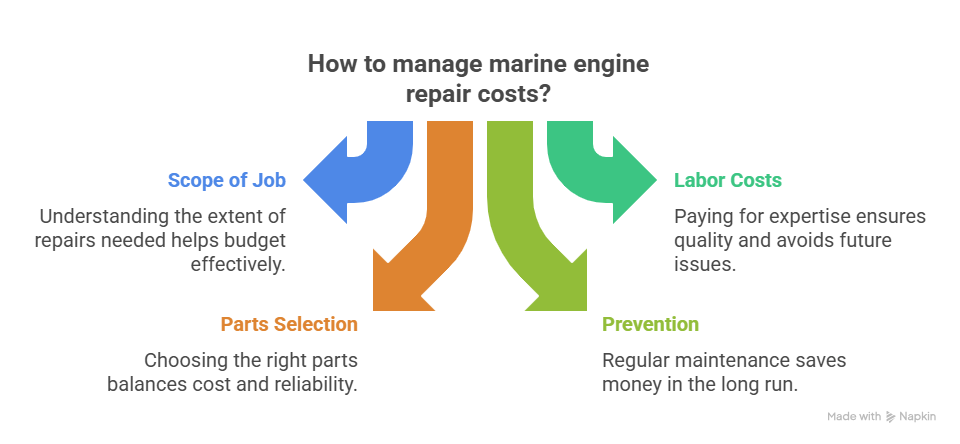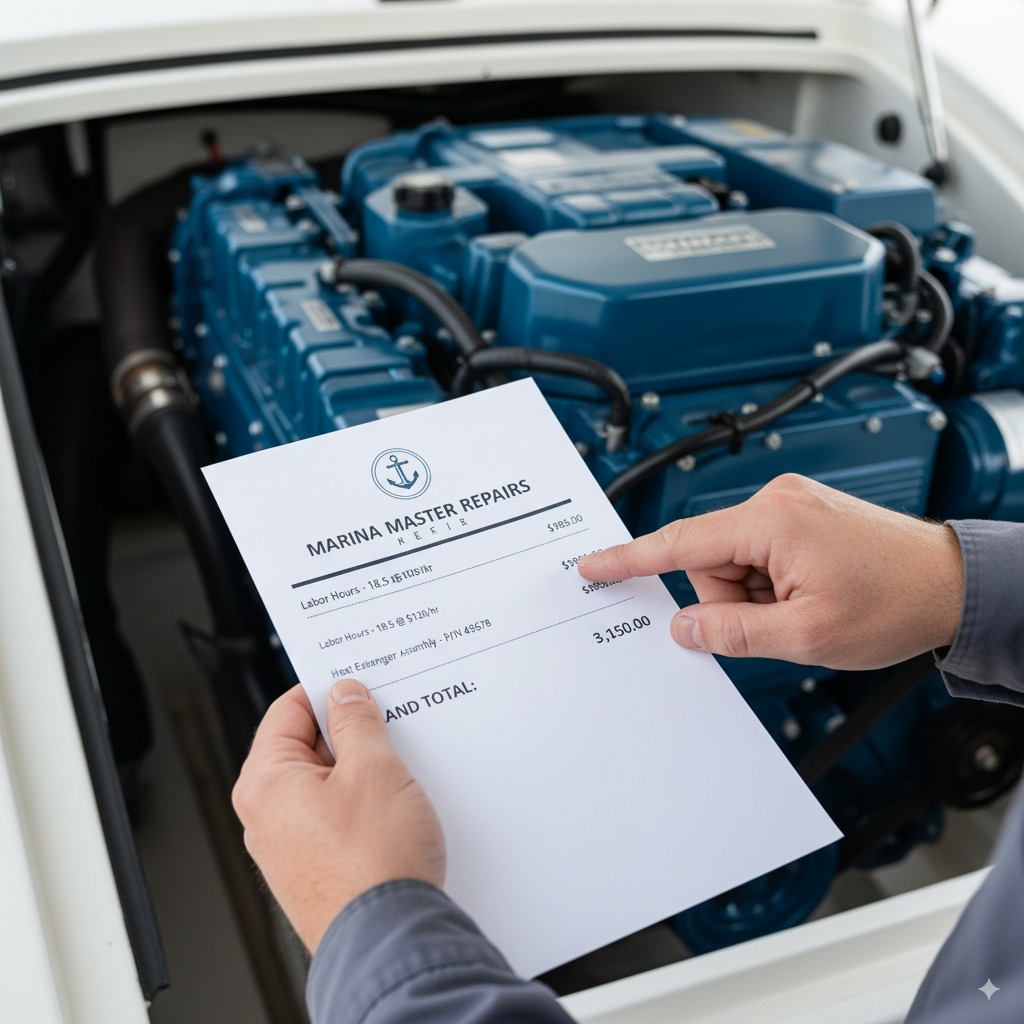I’ve spent the better part of my life with my knuckles busted and my hands stained with grease, fixing boat engines here in South Florida. And if there’s one thing that surprises boat owners more than anything, it’s the repair bill. I’ve seen that look a hundred times—a mix of confusion and frustration when they see the final number.
I remember a guy named Dave who brought in his 30-foot cruiser. The engine was overheating. He figured it was just a thermostat, a cheap and easy fix. But after a proper diagnostic, we found the real culprit: a corroded heat exchanger that was slowly starving the engine of coolant. What he thought would be a couple hundred dollars turned into a couple thousand. He was floored. I walked him through it, explaining the cost factors in marine engine repair—the specialized parts, the labor to access the system, the proper disposal of old coolant. By the end, he understood. He wasn’t happy about the cost, but he wasn’t confused anymore.
That’s why I’m writing this. I want to pull back the curtain and show you why that repair bill looks the way it does. It’s not random. Understanding the core cost factors in marine engine repair is the first step to becoming a smarter, more confident boat owner.
Table of Contents
The Big Three: Labor, Parts, and Scope
When you get down to it, almost every repair bill is built on three pillars: the scope of the job, the cost of the parts, and the labor to put it all together.
1. The Scope of the Job: From Tune-ups to Transplants
The biggest driver of cost is what actually needs to be done. A simple annual service with fluid changes and new spark plugs is going to be on a completely different planet than a full engine rebuild.
- Minor Repairs: Things like replacing an impeller, changing belts, or a simple tune-up. These are usually a few hundred dollars and are predictable.
- Major Repairs: This is where the numbers get big. Engine rebuilds, transmission work, fixing major electrical faults. These jobs take time, specialized tools, and a lot of parts. This is where understanding the cost factors in marine engine repair becomes critical for your budget.
And don’t forget that different engines have different needs. A complex marine diesel repair will almost always cost more than fixing a simple outboard, due to the specialized knowledge and heavier components involved.

2. Labor: You’re Paying for Expertise, Not Just Time
Labor is a huge part of the bill, and it’s where I see the most confusion. A good marine mechanic isn’t just a guy with a wrench; he’s a specialist.
- Hourly Rates: Expect to pay anywhere from $100 to $150 an hour for a good, certified mechanic. For a highly specialized diesel tech or an electronics wizard, that rate can easily jump to $175 an hour or more.
- Why So Much? You’re paying for years of training, expensive diagnostic tools, and the expertise to get the job done right the first time. A cheaper mechanic who misdiagnoses the problem will cost you far more in the long run. Good labor is one of the most important cost factors in marine engine repair.
- Location Matters: A mobile mechanic coming to your dock will charge more than a shop to cover travel time. And a busy marina in peak season will have higher rates than a sleepy lake town in the off-season.
3. Parts: It’s Not a Car Engine
Marine parts are expensive. There’s no way around it. They are built to survive in a brutal saltwater environment, which means they use different, more expensive materials than car parts. The production numbers are also much lower, so there’s no economy of scale.
Here’s a quick breakdown of what to expect:
| Part Category | Price Range | Notes |
|---|---|---|
| Routine Maintenance | $50 – $300 | Impellers, filters, spark plugs, belts. |
| Mid-Level Repairs | $300 – $1,500 | Water pumps, starters, alternators. |
| Major Components | $1,500 – $10,000+ | Engine blocks, transmissions, fuel injection systems. |
You have options: OEM (Original Equipment Manufacturer), aftermarket, or used. OEM parts are the highest quality but also the most expensive. Aftermarket can be a good value, but quality varies. Used parts are a gamble. Knowing which to choose is another key element in managing the cost factors in marine engine repair.
The “Hidden” Costs: Overheads and Compliance
Beyond the big three, there are other charges that often surprise people. These are the operational realities of running a modern repair shop.
- Haul-Out Fees: If your boat has to come out of the water for the repair, that’s an extra cost, usually charged by the foot.
- Shop Supplies: Most shops add a small fee (around 5% of labor) to cover things like rags, cleaners, and other consumables.
- Environmental Fees: We can’t just dump old oil and coolant down the drain. The proper, legal disposal of hazardous materials costs money, and that cost is passed on to the customer. This is a non-negotiable part of the cost factors in marine engine repair today.
The Best Way to Save Money: Prevention
Want to know the real secret to controlling the cost factors in marine engine repair? It’s simple: maintain your engine. An ounce of prevention is worth a pound of cure, and in the marine world, it’s worth thousands of dollars.
Regular oil changes, cooling system flushes, and filter replacements are your best defense against catastrophic failure. I’ve seen more engines destroyed by a failed $50 impeller than any other single part. Don’t be that guy. Addressing the small cost factors in marine engine repair proactively will save you from the big ones.
FAQ: Questions I Get Asked All the Time
Why did my repair estimate seem so vague?
A good mechanic will often give you a range. It’s because we can’t always know the full extent of the damage until we get inside the engine. Hidden corrosion or a cracked part can change the scope of the job dramatically.
Is it cheaper to do the work in the off-season?
Sometimes, yes. Shops are less busy, and you might be able to get a better labor rate or a quicker turnaround time. It’s always worth asking.
Can I save money by buying my own parts?
You might, but most shops won’t warranty the labor if you provide the parts. If the part fails, you’re paying them to do the job all over again. Be careful with this one.
My engine is old. Is it worth fixing?
That’s the million-dollar question. You have to weigh the cost of the repair against the value and reliability of the engine. If it’s a major repair on a very old motor, sometimes replacing it is the smarter long-term investment. This is the ultimate evaluation of the cost factors in marine engine repair.
How can I be sure I’m not getting ripped off?
Get multiple quotes for major jobs. Ask for a detailed breakdown of the costs. And most importantly, find a mechanic you trust. A good reputation is earned.
Key Takeaways: My Final Advice
At the end of the day, understanding the cost factors in marine engine repair gives you power. It helps you budget, ask the right questions, and make smart decisions for your boat.
- It’s More Than Just the Engine: Remember to factor in labor, specialized parts, and operational fees.
- Good Labor Isn’t Cheap: But cheap labor can be very expensive. Pay for a certified, experienced technician.
- Maintenance is Your Best Investment: The cheapest repair is the one you never have to make. Stick to your maintenance schedule religiously.
- Ask Questions: A good shop will be happy to explain the charges and walk you through the repair.
- Know When to Say When: For older engines, be realistic about the cost factors in marine engine repair and weigh them against the cost of a new, reliable motor.
Keeping your boat on the water costs money, but it doesn’t have to be a mystery. With a little knowledge, you can navigate the costs with confidence and keep your focus on what really matters: enjoying your time on the water.
Author Bio
I’m Alex, a 15-year marine technician in South Florida, ABYC-certified. My specialty is diagnostics, and I’ve helped hundreds of boat owners understand the real cost factors in marine engine repair. From outboards to inboards, I believe an informed owner is a happy owner. I’ve seen it all at marinas like Dinner Key and Bahia Mar.


Leave a Reply